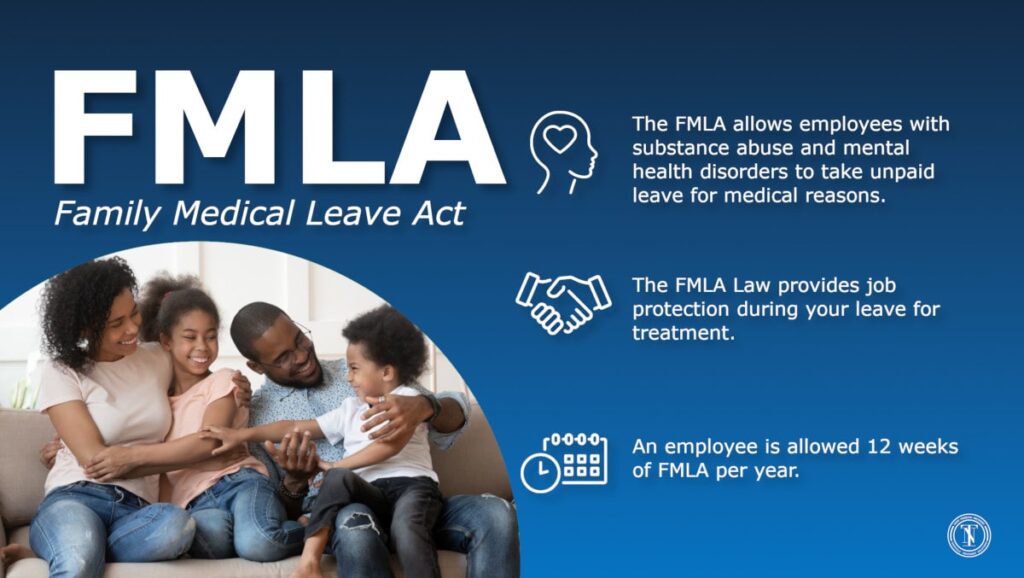
Medically Reviewed by Julie Bilbrey
Last Updated on:
December 23, 2024
Find the time and space for healing with proper medical coverage and work leave.
Substance abuse is a serious health issue that requires immediate and effective treatment. However, many people are concerned about taking time off work to seek help and often ask, “does FMLA cover drug rehab?.”
Yes, the Family and Medical Leave Act (FMLA) provides certain protections to employees who need to take leave for medical reasons, including treatment for substance abuse.
The Family and Medical Leave Act (FMLA) is a federal law that provides eligible employees up to 12 weeks of unpaid, job-protected leave per year for specific medical and family reasons. Passed by President Clinton in 1993, this includes serious health conditions that require treatment, such as substance abuse and mental health conditions.
FMLA for drug rehab allows eligible employees of covered employers to take unpaid, job-protected leave for certain family and medical reasons, while maintaining their group health insurance coverage under the same terms and conditions as if they were still working.

Because substance use disorder effects a person physically, psychologically, and mentally, FMLA can be used for alcohol and drug rehab.
If an employee is enrolled in a rehab program, they are covered under FMLA as long as they meet the eligibility requirements.
FMLA leave applies whether the individual is attending an inpatient rehab program or an outpatient rehab program that requires ongoing treatment.
To apply for FMLA for substance abuse or mental health treatment, you must notify your employer and provide medical certification from the treatment provider after enrolling in the program. Your healthcare provider will confirm that your treatment is necessary and qualifies as a serious health condition.
If you’re afraid to take time off of work, Nashville Treatment Solutions can assist you in qualifying for FMLA. Give us a call now at 615-234-9425 or verify your insurance.
Be sure to follow your employer’s specific policies for requesting leave under FMLA.
If you’re looking to qualify for FMLA, be sure to do your due diligence and understand all of your coverage.
While substance abuse is a serious mental health condition, FMLA does not apply to every employee. To be eligible, your employer must be:
Yes, FMLA can be used for outpatient rehab, provided the treatment is considered medically necessary including chronic and life-threatening conditions. This does apply to outpatient rehab programs and includes:
If you meet the eligibility requirements and provide the necessary documentation from your treatment provider, your employer cannot deny your FMLA leave.
However, FMLA does not guarantee paid leave. You are entitled to job protection, but your employer is not obligated to pay you during the leave unless they offer paid leave benefits.
FMLA does cover mental health treatment if it is part of a serious health condition and affects your everyday life.
For individuals who struggle with both substance abuse and co-occurring mental health disorders, FMLA can be used to cover treatment for both. Many treatment programs integrate dual diagnosis treatment that incorporate mental health treatment with addiction care, and FMLA recognizes this as a qualifying condition.
Substance abuse qualifies as a serious health condition under FMLA if treatment is necessary either in an inpatient facility or on a continuing outpatient basis. The condition must interfere with your ability to perform your job or function in daily life.
However, there are other conditions, including mental health that can be covered under FMLA, which include:
The length of addiction treatment varies based on individual needs. Inpatient treatment typically lasts 30 to 90 days, while outpatient programs may take longer, often extending up to six months or more.
FMLA for drug rehab provides up to 12 weeks of leave, which can accommodate a significant portion of most treatment plans.
The Americans with Disabilities Act (ADA) also provides protections for employees with substance abuse disorders. While the ADA covers people who are in recovery and no longer using drugs or alcohol, FMLA applies to those who need to take time off to begin or continue treatment. Together, these laws help protect individuals from discrimination while they seek help.
FMLA provides job protection during your leave for treatment. However, if you violate company policies regarding substance abuse outside of seeking treatment, you may still face disciplinary action or termination. It’s important to be open and honest with your employer about your need for rehab to avoid potential misunderstandings.
No, you are not required to disclose specific details about your substance use disorder, including that you are attending alcohol or drug rehab, when requesting FMLA leave.
Under the Family and Medical Leave Act (FMLA), you only need to provide enough information to demonstrate that your leave is for a qualifying medical reason. Your employer may request a certification from a healthcare provider to confirm the need for leave, but the nature of the treatment or diagnosis is not required to be shared.
Due to the Health Insurance Portability and Accountability Act (HIPAA), which ensures that your medical information, including substance abuse treatment, all information about your care in addiction treatment remains private.
Your employer is not permitted to ask for detailed information about your treatment, and any medical records or documentation provided must be kept confidential. This means that even though you may need to take leave for rehab, your privacy is safeguarded by law, and your employer cannot share this information with others without your permission.
Despite the protections offered by FMLA, many individuals still hesitate to seek treatment due to fear of stigma, job security, and financial concerns.
FMLA ensures that your job is protected, but it doesn’t guarantee pay during your leave. Understanding your rights under FMLA and speaking with HR about additional options, such as using paid time off, can help alleviate some of these concerns.
More: Stress Leave From Work
If you’re struggling with substance abuse and are concerned about how it may impact your job, FMLA can provide the time and job security you need to focus on your recovery.
Don’t let the fear of losing your job stop you from getting help. Contact us today to learn more about how we can assist you in navigating FMLA and starting your journey to recovery.
Let us Help You Find Treatment
Posted onTrustindex verifies that the original source of the review is Google. I am glad this is locations is here. There are wonderful people running the place too and good people conquering their obstacles every day. I was one of them.Posted onTrustindex verifies that the original source of the review is Google. When you finally commit to health and healing, it has to be done in a place where you are 100% comfortable. I found the ease in reaching the facility and the atmosphere it provided to allow me to reach that comfort level easily. All are different but for me their outpatient program was just my size.Posted onTrustindex verifies that the original source of the review is Google. My addiction affected not only me but my entire family. That's why they work closely with families to provide education, support, and resources to help all of us cope and heal. A special thank you to Ms. Jordan who has been able to provide a lifesaving hand in my recovery.Posted onTrustindex verifies that the original source of the review is Google. They helped me to make my recovery a success. They were able to reach me in a way that others have not been able to. I was ready this time and my success shows that point is reached. It means the world to me to be able to say I’m a happy and healthy person for the first time in my life.Posted onTrustindex verifies that the original source of the review is Google. Wonderful place great services.Posted onTrustindex verifies that the original source of the review is Google. Excellent treatment professionals across the board thank youPosted onTrustindex verifies that the original source of the review is Google. Such a wonderful place. Life changing for sure!!! Would highly recommendPosted onTrustindex verifies that the original source of the review is Google. Amazing place to start recovery! Life saving!Posted onTrustindex verifies that the original source of the review is Google. Great staff very supportivePosted onTrustindex verifies that the original source of the review is Google. Great place. A true heart for recovery